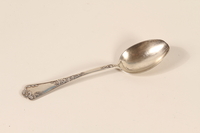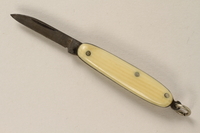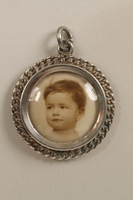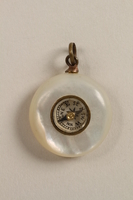Overview
- Description
- The Elisabeth Orsten papers include an autograph book, biographical materials, correspondence, a diary, photographs, printed materials, and school records documenting her childhood in Vienna, her departure for England on a Kindertransport with her brother, Georg, their care and education in England, the Ornstein family’s immigration to the United States, and her grandparents’ continued suffering in Vienna.
The autograph book contains illustrations and signed poems by Elisabeth Orsten’s parents and friends in Vienna.
Correspondence primarily documents arrangements for Elisabeth’s care in England. This series includes letters from Elisabeth’s parents to her caregiver in England, correspondence with Georg’s caregivers in England, correspondence with aid organizations in England arranging care for Elisabeth and Georg, and correspondence with guarantors who helped fund Elisabeth’s care in England. This series also include letters from Elisabeth Orsten’s grandparents, Paula and Eugen Fulda, describing their difficult lives as they remained trapped in Vienna.
The diary was a farewell gift to Elisabeth from her nanny upon her departure for England on a Kindertransport in January 1939. The entries are in German and English and describe Elisabeth’s life in England in 1939 and 1940 with two additional entries about her life in America in 1941 and 1944.
Emigration and immigration records include a copy of Paul Ornstein’s Heimatschein citizenship document, letters and affidavits in support of the Ornstein family’s immigration, and correspondence with the American Consulate General in London about Elisabeth’s immigration.
Photographs depict Elisabeth Orsten as a baby, around the time of her journey to England in 1939, and as a member of the WACS around 1948.
Printed materials consist of clippings about Elisabeth’s college scholarship, Georg’s military service, and a couple of miscellaneous items.
School records document Elisabeth’s education in England at the Garden School in High Wycombe and include three report cards, two news bulletins, and a notebook in which she recorded and illustrated her history lessons. - Date
-
inclusive:
circa 1936-1953
- Credit Line
- United States Holocaust Memorial Museum Collection, Gift of Elisabeth M. Orsten
- Collection Creator
- Elisabeth M. Orsten
- Biography
-
Elisabeth (Liesl) Ornstein was born on November 8, 1927, in Vienna, Austria, to Hildegard Fulda, born in 1900, and Dr. Paul Ornstein, born in 1898. Hilda’s father was a successful businessman and Hildegard received Lutheran instruction, but was never baptized. Paul had ceased to practice the Jewish faith prior to meeting Hildegard. The couple met when both were studying medicine at the University of Vienna. Paul was the director of a private clinic that specialized in cardiology. She had a brother, Georg, who was born in 1930. The family was wealthy and lived in the Wahring district of Vienna. In 1933-34, Hildegard converted to Catholicism and the children were baptized. They were cared for by their nanny, a Catholic peasant, Emmy Burgmann, and they attended Catholic schools.
On March 12, 1938, German troops marched into Austria and annexed the country. Anti-Jewish legislation was enacted prohibiting Jews from many cultural and economic activities. Despite their conversion to Catholicism, the Ornstein’s were considered Jews under Nazi racial laws. Elisabeth and Georg were sent to live with their uncles in Frankfurt, Germany, due to the increasing anti-Semitism. The November 1938 Kristallnacht [Night of Broken Glass] pogrom was particularly brutal in Austria. The children’s uncles were arrested and deported to concentration camps. Hildegard brought the children back to Vienna and they redoubled their efforts to get out of Austria. The Jewish Refugee Children’s movement found a family in England, Esme Cooke’s, willing to take in Elisabeth as a foster daughter. The English Quakers agreed to find a family for Georg and included both children on a kindertransport that left Vienna for England in January 1939.
When the war began that September, the family Elisabeth was living with went to their country home and she was enrolled as a day student in a boarding school. Georg was placed with the Parrot couple in Scotland where he was very happy. But he was removed from there and sent to a home closer to Elizabeth. But they were not able to see each other, although they continued to correspond. Elisabeth kept a diary during this time, and the entries show her efforts in trying to remember German.
Her parents obtained visas for the United States with the help of distant Fulda relatives and arrived in New York City in January 1940. They moved to Buffalo where Paul worked part-time at a hospital while preparing to take the qualifying medical license exams; Hildegard cleaned houses. After the evacuation of Allied troops from Europe at Dunkirk in June 1940, they decided to get the children to the US. Because of U-boat activity, the children traveled separately and their travel information could not be shared. Elisabeth travelled via the H.M.S. Antonia from Liverpool to Montreal in September 1940 and then by train with other refugee children to New York. No one was there when she arrived. After two days, her mother arrived and they waited together for Georg. This was the last children’s transport to leave for the US because the one before Georg’s was sunk by the Germans.
During the fall of 1941, they learned that Elisabeth’s grandparents and great-aunts had committed suicide on the eve of their deportation to concentration camps. After passing his exams, Paul changed their name to Orsten. Fourteen year old Elisabeth had to attend kindergarten classes to learn English. Later, she received a scholarship to Manhattan College. In 1948, she joined the Women’s Army Corps (WAC), and translated captured German military documents for three years. Her brother served in the US Air Force and attended MIT. He received the Presidential Medal of Honor under President Truman for designing the first airborne nuclear detector capable of measuring radiation in the clouds. He and his wife were killed in a car crash in 1997. Paul died in 1957, age 59 years. Hildegard passed away in 1998, age 98 years.
Physical Details
- Genre/Form
- Photographs. Diaries.
- Extent
-
2 boxes
- System of Arrangement
- The Elisabeth Orsten papers are arranged as seven series: I. Autograph book, 1936-1938, II.Correspondence, 1939-1941, III. Diary, 1939-1944, IV. Emigration and immigration records, 1939-1942, V. Photographs, approximately 1929-1948, VI. Printed materials, approximately 1945-1953, VII. School records, 1939-1941
Rights & Restrictions
- Conditions on Access
- There are no known restrictions on access to this material.
- Conditions on Use
- Donor retains copyright on materials in 2000 donation. Other material in this collection may be protected by copyright and/or related rights. You do not require further permission from the Museum to use this material. The user is solely responsible for making a determination as to if and how the material may be used.
Keywords & Subjects
Administrative Notes
- Holder of Originals
-
United States Holocaust Memorial Museum
- Legal Status
- Permanent Collection
- Provenance
- Elisabeth Orsten donated the Elisabeth Orsten papers to the United States Holocaust Memorial Museum in 2000 and 2001. The accession formerly cataloged as 2001.280 has been incorporated into this collection.
- Funding Note
- The accessibility of this collection was made possible by the generous donors to our crowdfunded Save Their Stories campaign.
- Special Collection
-
Save Their Stories
- Primary Number
- 2000.417.1
- Record last modified:
- 2024-04-11 13:18:50
- This page:
- https://collections.ushmm.org/search/catalog/irn98646
Additional Resources
Download & Licensing
In-Person Research
- Available for Research
- Plan a Research Visit
-
Request in Shapell Center Reading Room
Bowie, MD
Contact Us
Also in Elisabeth Orsten family collection
The collection consists of a five piece silver cutlery set, a miniature ivory penknife, a silver locket, a miniature mother of pearl compass, an autograph book, biographical materials, correspondence, a diary, photographs, printed materials, and school records relating to the experiences of Elizabeth M. Ornstein (later Orsten) and her family in Vienna, Austria, before and during the Holocaust, and the Ornstein family’s immigration to the United States.
Date: approximately 1936-1953

Engraved silver 5 piece cutlery set carried by a Kindertransport refugee
Object
Set of tableware including a soup spoon, teaspoon, fork, and knife inside a cloth roll given to 13 year old Elisabeth (Liesl) Orsten by her parents after they were reunited in New York in 1940 during the war. Elisabeth and her family were from Vienna where the annexation of Austria by Germany in 1938 led to severe anti-Semitic persecution. Although they were practicing Catholics and did not identify themselves as Jews, they were Jews under Nazi law. After Kristallnacht in November 9, 1938, Elisabeth's parents decided to send the children out of the country. Elisabeth and Georg, 9 years, were given passage on a Kindertransport to England by the Quakers in January 1939. Her parents obtained US visas and arrived in New York in January 1940. After the evacuation at Dunkirk in June of that year, her parents insisted that the children be sent to the US, although German U-boats made trans-Atlantic crossings treacherous. The children traveled separately but, by September 1940, the family was together.

Miniature ivory penknife carried by an Austrian refugee family
Object
Miniature penknife given to 13 year old Elisabeth Ornstein by her parents Hilda and Paul after they were reunited in New York in 1940 during the war. Elisabeth and her family were from Vienna where the annexation of Austria by Germany in 1938 led to severe anti-Semitic persecution. Although they were practicing Catholics and did not identify themselves as Jews, they were Jews under Nazi law. After Kristallnacht in November 9, 1938, Elisabeth's parents decided to send the children out of the country. Elisabeth and Georg, 9 years, were given passage on a Kindertransport to England by the Quakers in January 1939. Her parents obtained US visas and arrived in New York in January 1940. After the evacuation at Dunkirk in June of that year, her parents insisted that the children be sent to the US, although German U-boats made trans-Atlantic crossings treacherous. The children traveled separately but, by September 1940, the family was together.

Silver locket with an engraved monogram and an infant's photo saved by an Austrian refugee family
Object
Locket with her baby photo and her mother's initials given to 13 year old Elisabeth [Liesl] Ornstein by her mother Hilda after they were reunited in New York in 1940 during the war. Elisabeth and her family were from Vienna where the annexation of Austria by Germany in 1938 led to severe anti-Semitic persecution. Although they were practicing Catholics and did not identify themselves as Jews, they were Jews under Nazi law. After Kristallnacht in November 9, 1938, Elisabeth's parents decided to send the children out of the country. Elisabeth and Georg, 9 years, were given passage on a Kindertransport to England by the Quakers in January 1939. Her parents obtained US visas and arrived in New York in January 1940. After the evacuation at Dunkirk in June of that year, her parents insisted that the children be sent to the US, although German U-boats made trans-Atlantic crossings treacherous. The children traveled separately but, by September 1940, the family was together.

Miniature mother of pearl compass carried by an Austrian refugee family
Object
Miniature compass given to Elisabeth [Liesl] Ornstein, 13, by her parents Hilda and Paul after they were reunited in New York in 1940 during the war. Elisabeth and her family were from Vienna where the annexation of Austria by Germany in 1938 led to severe anti-Jewish persecution. Although they were practicing Catholics and did not identify themselves as Jews, they were Jews under Nazi law. After Kristallnacht in November 9, 1938, Elisabeth's parents decided to send the children out of the country. Elisabeth and Georg, 9, were given passage on a Kindertransport to England by the Quakers in January 1939. Her parents obtained US visas and arrived in New York in January 1940. After the evacuation at Dunkirk in June of that year, her parents insisted that the children be sent to the US, although German U-boats made trans-Atlantic crossings treacherous. The children traveled separately but, by September 1940, the family was together.



